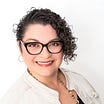The following essay is the fourth reflection for our May focus on the spiritual practice of Study. Read more here about our exploration of the spiritual disciplines in 2025 through creative and reflective writing.
When my husband and I followed God from California to the Midwest in 2018, we left behind our sons, our church family, our support network, and our doctors. As my chronic pain and fatigue increased, my mobility decreased. Finding doctors and a church became top priorities. But I had just signed a contract for my first devotional, Waiting for God: Trusting Him with the Answers to Every Prayer. So, I had Scriptures to study and words to write. I continued reading the Bible in a Year, something I’ve enjoyed since 2005. I shared Scripture online and in articles for Our Daily Bread and God Hears Her each month. I prayed as I studied God’s Word within its context. I prayed daily, for people and with people. Still, I woke up one day feeling depleted and alone.
As my puppy licked tears off my cheeks, I looked out the window. A crane landed on the muddied bank of the creek next to my front yard. Rays of sunlight pierced through the dark gray clouds, like a spotlight on the white bird surrounded by lush green foliage. The majestic crane ruffled its feathers, spread its wings, and took flight. I wept and praised Jesus as the Holy Spirit brought Scripture to my mind, verses I’d never intentionally memorized.
I used keywords to find the verses in my concordance. I read different translations, word studies, and the commentary notes in my NIV Life Application Bible. I wrote the verses on a 3x5 notecard: “The heavens tell about the glory of God. The skies announce what his hands have made. Each new day tells more of the story, and each night reveals more and more about God’s power” (Psalm 19:1-2, ERV). Sobbing, I poured out the first draft of What Color is God’s Love? on paper. God revealed the full spectrum of His character as I examined His Word and His fingerprints in the colorful world He created and sustains. He transformed that poem, while transforming me, as I engaged with Him through His Word, His Creation, and His people during the remainder of our two-year stint in the Midwest. Through that experience, I realized there was a difference between studying the Bible to communicate God’s Word and connecting with God as I studied His Word so I could share Him with others. But in His grace, God assured me that He had already prepared me for that season when I felt as if I had severed my connection with Him.
Studying to Know More or to Know God More
In 2001, seventeen years before our move to the Midwest, my first spiritual mentor said, “If you want to know God intimately, you need to pray, study His Word daily, and ask Him to help you obey Him.” I asked the Holy Spirit to make me more like Jesus and committed to lifelong learning. I memorized and meditated on Scripture. I read Bible verses out loud and silently. I paraphrased and personalized verses in my journal. I used comprehensive guides on the whole Bible. I read through Bibles organized for daily reading, like The One Year Chronological Bible, or through different translations yearly: NIV, ESV, CSB, NASB, NLT, and The Message.
I filled my bookcases with Bible dictionaries and books on the manners and customs of Bible times, the Creeds, the Early Church Fathers, and systematic theology. I learned how to exegete the text, how to let God’s Word speak to me instead of forcing my opinion or agenda on the text. I identified the genre of the text and determined if the text was descriptive or prescriptive. I studied preaching, discipleship, and spiritual growth.
I used Bible Gateway, the Blue Letter Bible, and Logos as study tools. I devoured How to Read the Bible for All Its Worth and How to Read the Bible Book by Book by Stuart and Fee. I prayed through Misreading Scripture with Western Eyes: Removing Cultural Blinders to Better Understand the Bible by Richards and O’Brien. I read just about every book written by C.S. Lewis, A.W. Tozer, and R.T. Kendall. When I wrestled with challenging questions, I pulled out my copy of The New Evidence that Demands a Verdict by Josh McDowell.
In 2014, however, my mom asked me to serve as her live-in caregiver at a cancer center hundreds of miles away from home. I couldn’t take my library. I would barely have time to read my Bible as I cared for her and managed my chronic pain and fatigue. That’s when the Holy Spirit reminded me that I was studying on the sacred ground of His constant presence whenever I acknowledged Him, meditated on His Word, and shared Him with others as I relied on His power.
God affirmed who He was and is and always will be. He used all the knowledge He’d provided through my past studies and my past experiences with Him, as I encountered Him in a way that reminded me that I serve the Living God. Even when I wasn’t able to open my Bible, the Holy Spirit helped me remember Scripture. I grew to know God on a deeper level when I engaged with Him through His creation, His people, and during those sweet moments when I was able to meet Him in His Word.
When doctors said my mom’s cancer had returned, she said she was ready to go home to Jesus. Less than a month later, as I grieved her loss and celebrated her homegoing, God affirmed His presence. He assured me that I could seek Him in His Word. But I could also believe what He’d already revealed about Himself. I didn’t know how desperately I’d need this reminder, how I had forgotten what He’d already taught me, until that day in Wisconsin and when I was lying in the hospital after we returned to California in 2022.
Studying on Sacred Ground
“All Scripture is inspired by God and is useful to teach us what is true and to make us realize what is wrong in our lives. It corrects us when we are wrong and teaches us to do what is right. God uses it to prepare and equip his people to do every good work” (2 Timothy 3:16-17, NLT). But the Holy Spirit is the only one who “searches out everything and shows us God’s deep secrets. No one can know a person’s thoughts except that person’s own spirit, and no one can know God’s thoughts except God’s own Spirit. And we have received God’s Spirit (not the world’s spirit), so we can know the wonderful things God has freely given us” (1 Corinthians 2:10-12, NLT). We simply cannot grow spiritually without God’s help (v. 14).
After spending one night in the hospital on January 14, 2022, unsure if I’d be able to walk again, I wrote the first chapter of Sacred Strides: Walking in the Power and Presence of the Holy Spirit. While in that hospital bed, with a pen and pad borrowed from my nurse, I began sharing how God met me that day in Wisconsin. During my week-long stay, I asked God to help me remember Bible verses and googled the addresses. When I struggled with focus or grew weary, I listened to an audio Bible, online messages by my favorite Bible teachers, and worship music. The Holy Spirit, who dwells in every believer in Jesus, even used rest to deepen my faith as I trusted Him to be my strength, my peace, and enduring hope.
The apostle Paul called the Galatians foolish for “trying to become perfect” by their “own human effort” (Galatians 3:3). We’re transformed by the will of the Spirit as we surrender to Him, not our willpower, our wisdom, or our strength. When we can’t open our Bibles or pray, the Spirit prays on our behalf (Romans 8:26-27). We need our triune God and the Bible, so we can know what He says and learn to recognize His voice!
Our day-to-day process of connecting with God as we rely on His grace and seek Him daily will be unique to each of us, and different as seasons change. However, the unchanging Spirit of the one true God always aligns with the unerring Word of God (1 Corinthians 2:14). The Spirit provides all we need to study as those approved by God (2 Timothy 2:15), as we live by faith in Christ one sacred stride at a time in the power and presence of the Holy Spirit.
*
Full Article and Resource Books List for Laymen and Beginners at www.xedixon.com
Xochitl (So-Cheel) E. Dixon, Our Daily Bread and God Hears Her writer and disabled Mexican author and speaker, is passionate about spiritual growth, discipleship, and prayer. Serving Jesus with her beautifully diverse family and service dog, Callie, Xochitl contributed to Tyndale’s NLT Go Bible for Kids and is the author of Waiting for God: Trusting Him for the Answers to Every Prayer, Sacred Strides: Walking in the Power and Presence of the Holy Spirit, What Color is God’s Love?, Wonderfully, Marvelously Brown, and the 2021 ECPA Christian Book Award Finalist, Different Like Me and Diferente como yo. Connect at www.xedixon.com.
SAVE THE DATE - upcoming webinar
Big Picture Editing: Why to Leave the Red Pen in the Drawer
Thursday, June 26 · 10:00-11:00am PT / 1:00pm-2:00pm ET
How do you approach editing a manuscript independently? How do you know when it's ready for an editor? And what kind of editor?
Not every editor looks at your manuscript with the same eye. If she is a line editor, she is deep into the process already and expects tidy storylines, fully-developed characters, and tight dialogue. But a developmental editor has her watercolor pens out, ready to paint broad strokes that help you define the direction of your work in progress. Copyeditors fall somewhere in between.
This webinar will discuss the different editing stages and a few simple ways to prepare your work for an editor.
This webinar is free for Redbud Writers Guild members (no need to register), $15 for non-members. All proceeds go to support our Women of Color Mentoring Program.
Recordings will be sent to everyone who is registered.
P.S. Know someone who might be encouraged by this post or interested in our upcoming webinars? Forward this to them today!









I love how you walk us through the ways studying scripture has ministered to you and inspires your writing! ✍🏾
Terrific reminders about the truth of who God is. And thanks for the resource list!